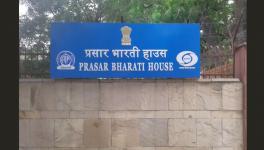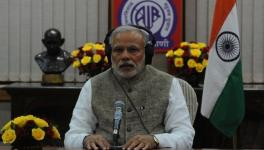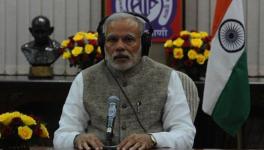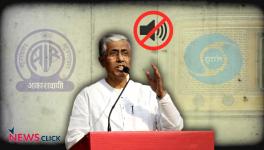West Bengal: Closure of AIR’s Popular FM Station Sparks Discontent
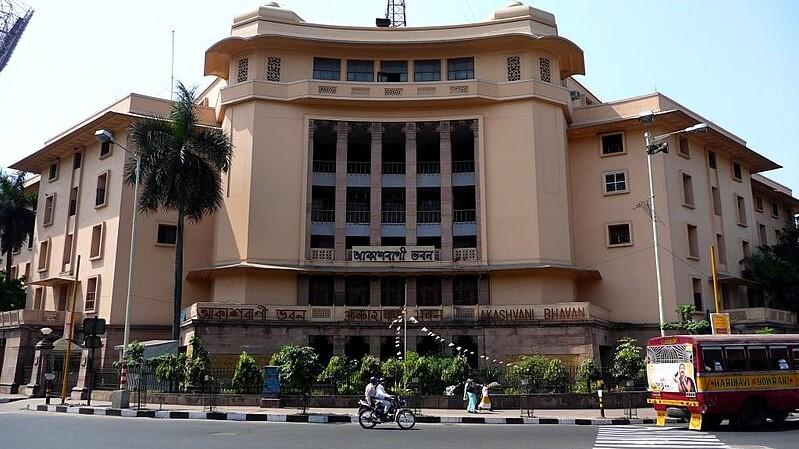
Akashvani Bhavan, Kolkata. Image Courtesy: Wikimedia Commons
The Kolkata station of All India Radio (AIR), which is popularly called Akashvani Kolkata, started broadcasting programmes on August 26, 1927. Since then, it has occupied an important place in the cultural landscape of Bengal. Not only has it gained popularity by providing high-quality entertainment by ensuring performance of the reputed artists but it has also come up with programmes for certain sections of the society, including farmers, workers, women and children.
Some of AIR Kolkata’s programmes are still quite popular. The advent of television, however, waned its popularity a little in the last decade of the previous century. However, the launching of the FM station recaptured the attention of the radio listeners.
What was instrumental in establishing the connection was the launch of a number of talk shows designed for listeners of different age-groups, tastes and languages with scope for live interaction. This captured the imagination of the audience so much so that the authorities had to step in to regulate the number of calls a listener could make in a week.
Although radio doesn't occupy the predominant position it once used to, for a number of reasons, listeners still look back to those heady days with a deep sense of longing. Social media has dismantled the rigid barrier between the audience and the presenters of these talk shows. So, the observation of the foundation day of Akashvani Kolkata is no longer confined to the programmes aired in the radio station alone. It is observed in social media as well.
This year, however, the mood among the radio-lovers is subdued as the Prasar Bharati authorities have decided to close down the transmission of FM Rainbow, the most popular station of Akashvani Kolkata.
Arbitrary decision
The Prasar Bharati authorities decided to relay the programmes aired through its primary station Geetanjali, previously known as Kolkata-A, through FM rainbow instead of broadcasting separate programmes from July 1, 2023.
The reason behind this sudden decision was not clearly communicated to the stakeholders, including listeners, presenters and others associated with the station. Therefore, this decision has sparked speculation among the observers. According to some, the primary reason behind this move is economic. In the name of austerity, the Prasar Bharati authorities are trying to curtail the number of radio stations it operates.
Some others, however, smell a more sinister design behind the decision. According to a person once associated to FM Rainbow and requesting anonymity, the focus of Prasar Bharati now is to prioritise national news over regional and local news, ostensibly to give more air time to the ruling dispensation at the Centre and its leaders. For this, they are trying to impose stricter control over regional stations. Besides, it would be easier to control the programmes if news and related content is increased at the expense of talk shows which, as a result of being interactive, are harder to control.
Apart from such speculation, there was a spontaneous outpouring of anguish and nostalgia in the social media. Many listeners and presenters wrote openly about the ‘stellar’ role FM Rainbow played in the cultural life in West Bengal for the past 25 years. An online campaign was initiated demanding its reopening. Before discussing the likely ramifications of this step, let us find out the reasons of FM's success in Bengal.
Reflection of Bengali ethos
With the onset of economic liberalisation in 1991, the entertainment landscape of this country underwent a qualitative change. The entry of private channels challenged the domination of state-owned broadcasters, Door Darshan and Akashvani. The proliferation of private TV channels captured a section of the audience. The FM channel was launched in order to allow private players to invest more in radio. The nature of the programmes were made more attractive by allowing listeners to participate. This type of programme was called the ‘talk show’. As noted earlier, the interactive talk shows became an instant hit with listeners.
Explaining the reason behind the success of talk shows, Supriyo Roy, a senior presenter and author, said, "Those programmes became popular because they resembled the spirit of adda (freewheeling conversation among friends over tea and snacks), which is an integral part of our Bengali ethos." The popularity of those talk shows was such that stalwarts from different walks of life agreed to take part in them. Apart from the presence of renowned people, what made those programmes very popular was the fact that they catered to the needs and aspirations of the listeners. People could find their daily life reflected in the programme.
Sudip Basu, a former presenter with Akashvani Kolkata and author of a memoir named 'Aamar Akashvani' (My Days in Akashvani), recounted some fascinating stories. He recounted how the authorities started a programme called "Puja Parikrama" which was some sort of a running commentary of Durga Puja, the predominant festival in Bengal.
Basu also recalls how in a morning show on December 26, 2004, an ordinary radio listener informed him and through him the public that something unnatural was taking place as he spotted unusual turbulence in a nearby waterbody. This was how listeners of FM Rainbow first came to know about the onset of Tsunami that day that created havoc in different parts of our country and beyond. The Tsunami found mention in the news after the morning show was over.
Entry of Private FM Stations
In May 2003, a host of private FM stations started functioning in Kolkata and in the country. This was the first time the unchallenged domination of Akashvani was called into question. It was true that the presenters of Akashvani Kolkata showed exemplary zeal and creativity to thwart the challenges from the newbies. It was their innovation and commitment that didn't allow the standard of the programmes to drop.
The attitude of the authorities was not so combative though. According to a former presenter, the Prasar Bharati authorities frittered away the advantage by reducing the reach of the FM stations. Moreover, the presenters were asked to follow the template of the private stations. Consequently, the quality of the programmes declined. The talk shows lost their conversational nature, leading to loss of interest among listeners.
Institutional Negligence
Another reason for this sad denouement is negligence of the authorities. Most of the talk shows were live in nature and were not recorded. Therefore, some very important programmes could not be stored for future. Besides, the overwhelming participation of the audience could not be demonstrated to the Prasar Bharati authorities whose only predilection, it seems, is to follow the neoliberal prescription of austerity.
The FM experiment has not had much success in other parts of this country. Therefore, Prasar Bharati took the step of closing down FM Rainbow stations in some cities. That it was a success in Kolkata could have been amply demonstrated had the programmes been recorded.
"I conducted interviews with at least 10 eminent personalities which turned out to be their last interview," said a senior presenter. "Very few people could understand the value of such programmes," the presenter added ruefully.
Radio Continues to be Relevant
The closure of FM Rainbow has set the cat among the pigeons, as it were. Many people took to social media to express their anguish about the future of the radio. Responding to this, Sohini Sengupta, a renowned presenter and voice-over artiste, told this writer, "I think radio is still relevant because of its wide reach among the masses. However, radio programmes must keep pace with the changing needs of listeners."
Considering the fast-changing trajectory of radio programmes in the past decade, this writer, an avid radio listener, is of the view that the present dispensation looks at it as a tool to amplify their propaganda. Radio is being used frequently by the Prime Minister to speak directly to the people bypassing all sorts of accountability. The news content is full of adulation for the powers that be at the Centre.
By denying space to the regional and local news and other aspects, this dispensation is seeking to impose homogeneity much to the detriment of the basic tenets of ‘Unity in Diversity’ which has so far been the cornerstone of our country’s cultural life. This is in keeping with the government's attempt to hollow out institutions of this country.
We must remain vigilant. Only then will we be able to safeguard the values of this Republic. We must not forget the stellar role that All India Radio has played in shaping our nation.
The writer is Vice President, National Platform for Rights of the Disabled, and an avid listener of All India Radio. The views are personal.
Get the latest reports & analysis with people's perspective on Protests, movements & deep analytical videos, discussions of the current affairs in your Telegram app. Subscribe to NewsClick's Telegram channel & get Real-Time updates on stories, as they get published on our website.










